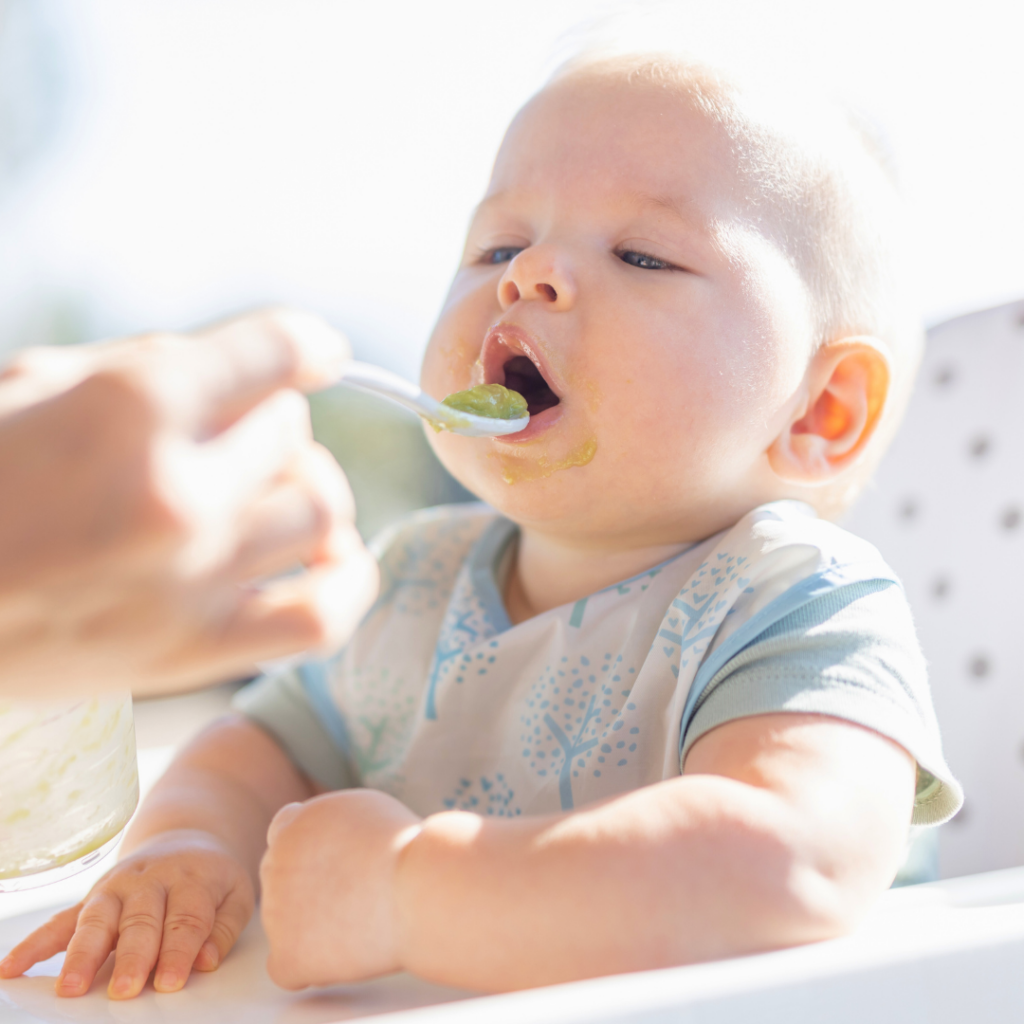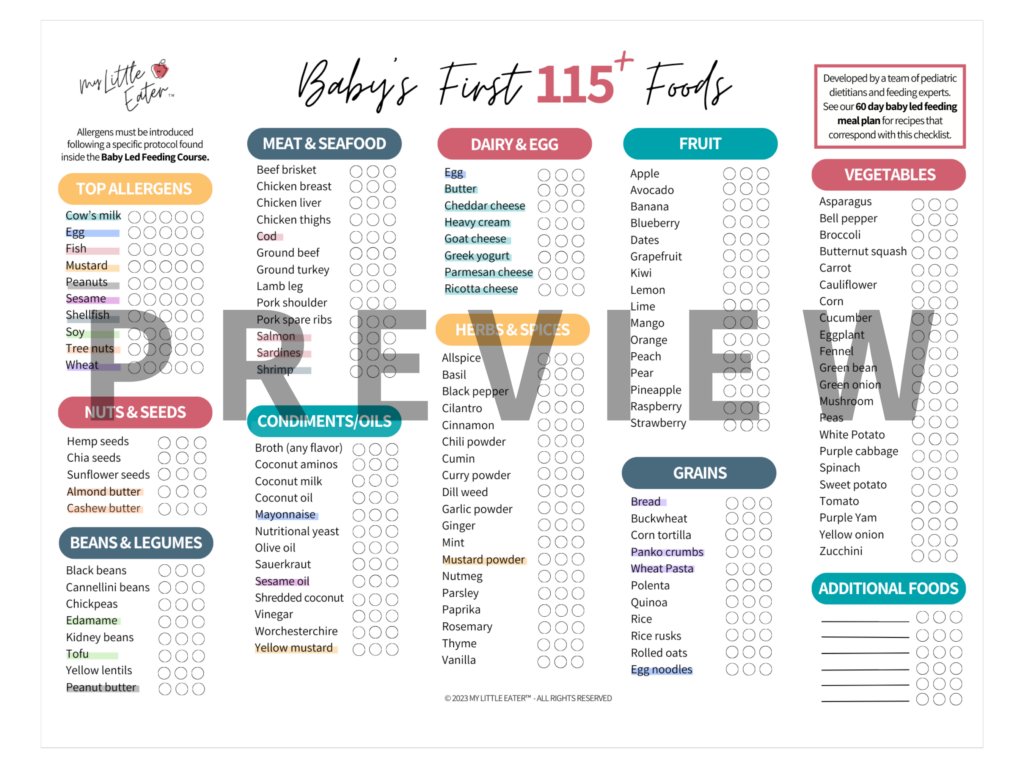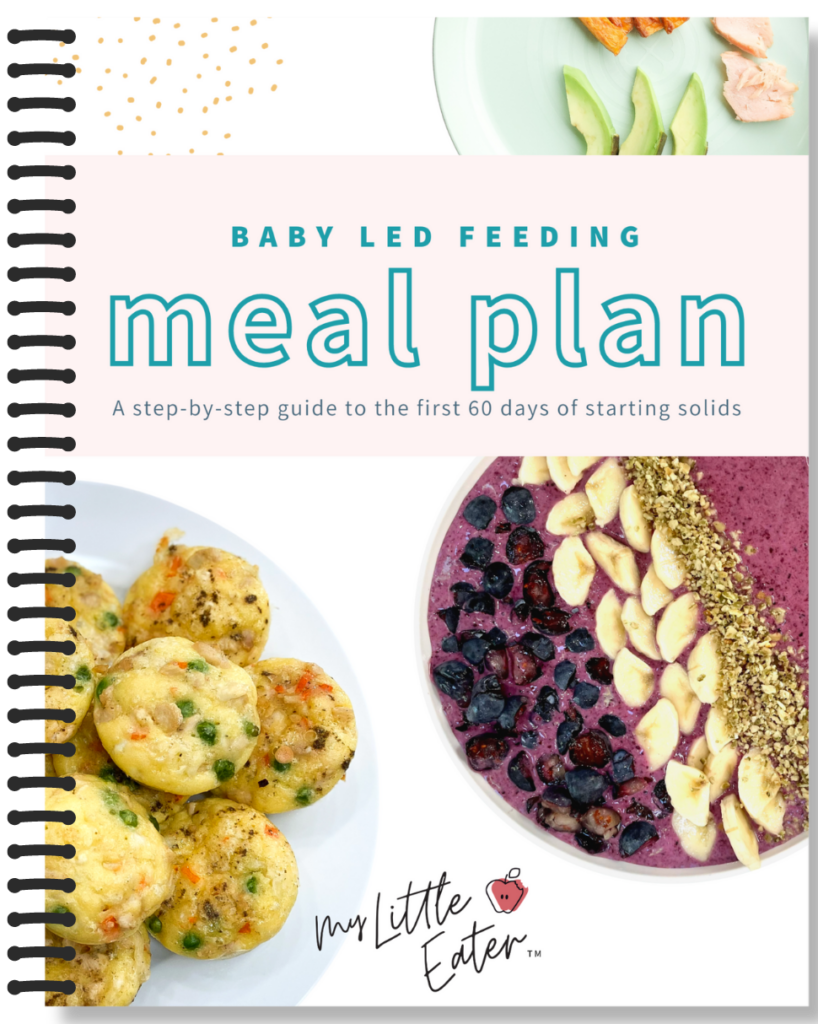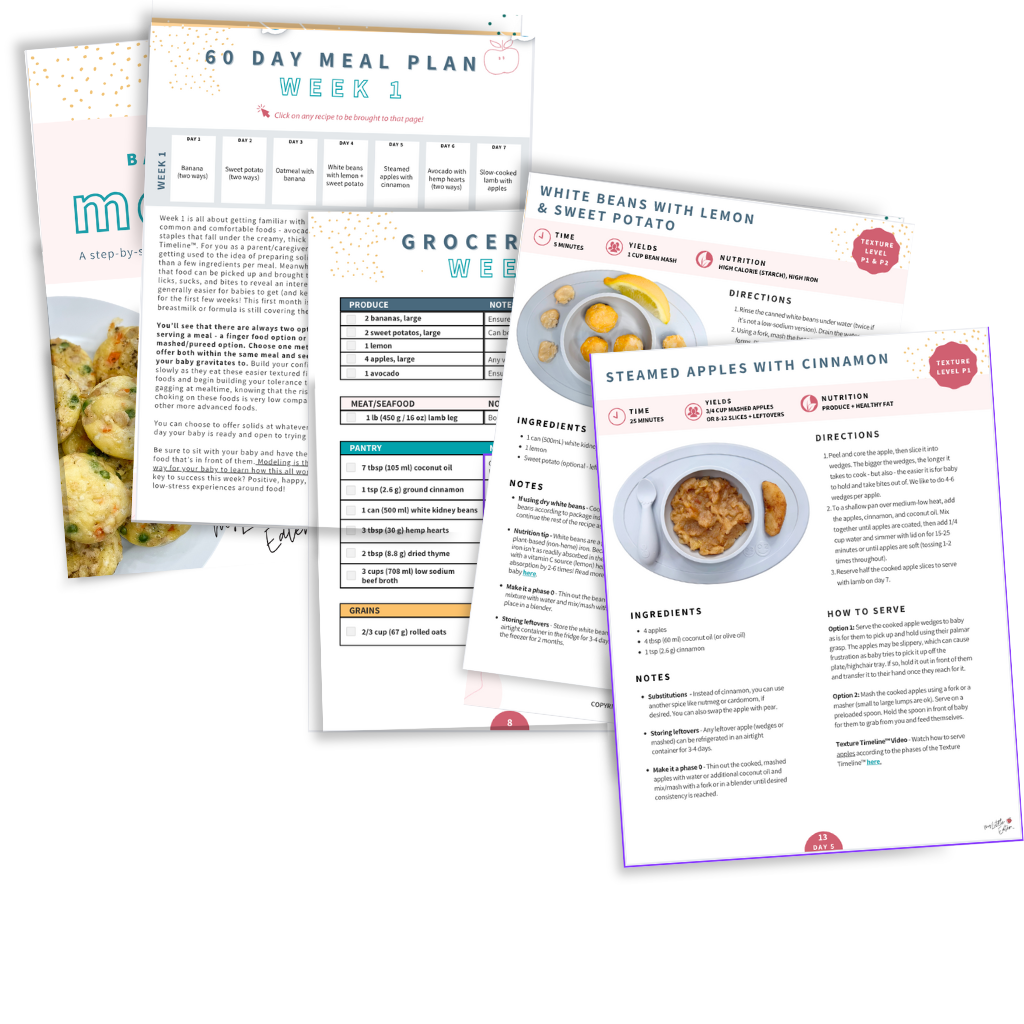- Originally Published: January 9, 2024
- No Comments
- Updated: January 13, 2025
- Edwena Kennedy, RD
Cooking with toddlers isn’t always sweet smiles, laughter, and warm memories (like what makes the Instagram feed). It’s often a lot messier!
Toddlers getting food everywhere, spilling ingredients, splashing half of the mixture out of the bowl as they stir – you know what we mean.
Sometimes it feels like it’s just not worth the effort.
We understand because we’ve been there. That said…we love to support you, push you a bit outside your comfort zone, and teach you how to take something stressful (like cooking with toddlers) and make it doable.
The long-term results are worth the effort you put in now, and that’s why we’re sharing with you our top 6 tips for stress-free cooking with toddlers, including simple tasks to get them involved based on their age.

The added bonus of cooking with kids is that it can actually manage (or prevent) picky eating. In fact it’s just one of our many strategies for helping toddlers and picky eaters!
For a full overview of our step-by-step process for feeding toddlers with confidence and ease, check out our Feeding Toddlers online course.
Currently on sale for 20% off with code HAPPY2025!
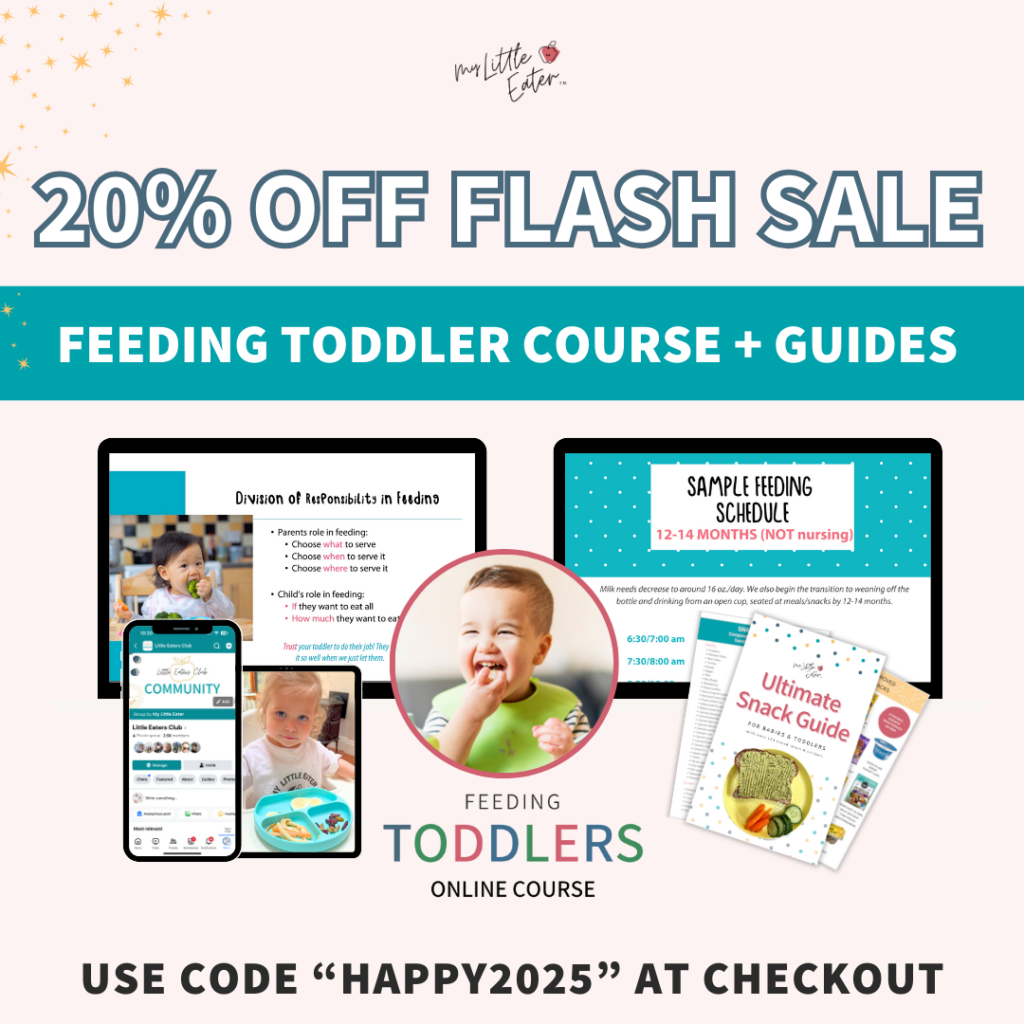
Table of Contents
Why you need to try cooking with your toddler
We know it’s stressful, sometimes full of tantrums, and let’s face it, it takes what should be a 20-minute task and triples it. But we wouldn’t suggest it if we didn’t believe the outcome was worth it, so let’s go through why you should give this a try!
Reason #1: Builds their skills in the kitchen
This is the obvious one.
When you think about the fact that they can use a butter knife or paring knife to chop, dice, or slice by the age of 5, or can sauté food over a hot pan by the age of 8 or 9…wouldn’t you want your kids to be able to do this?
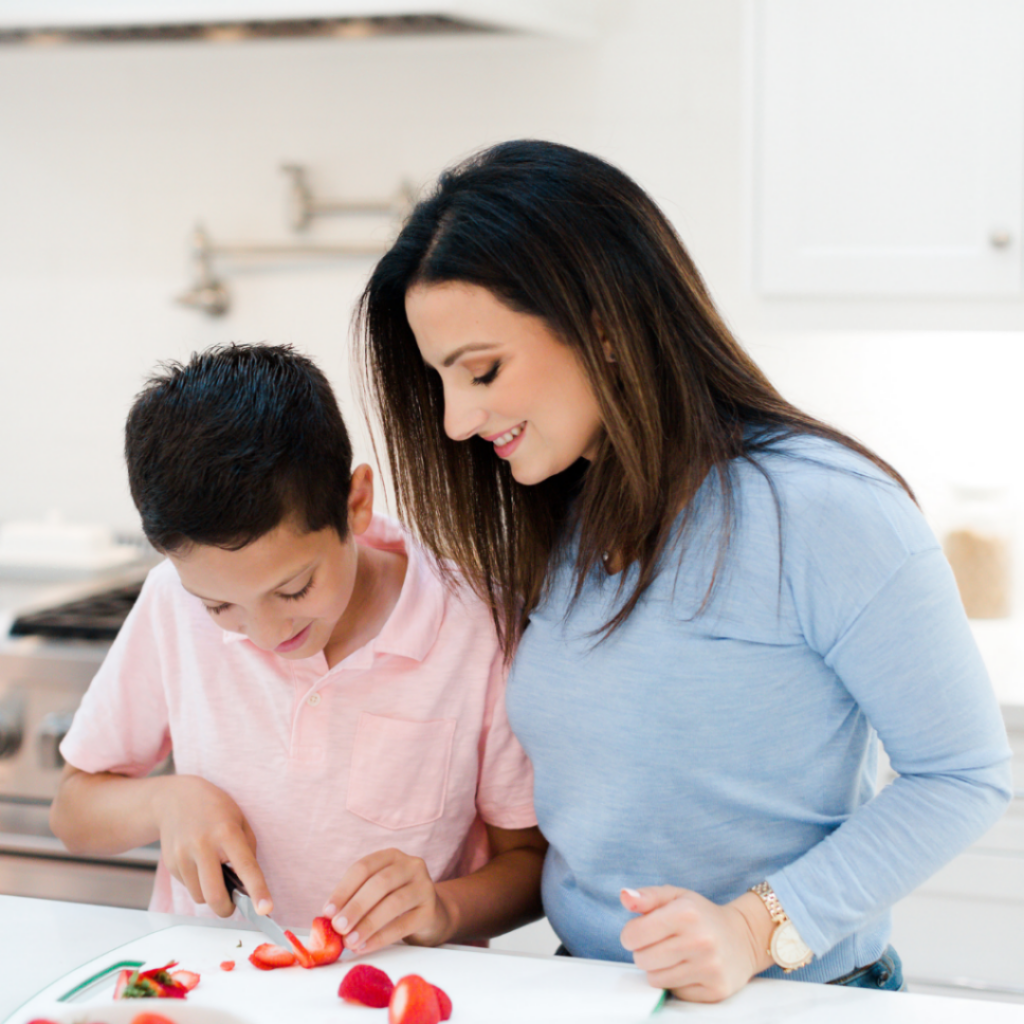
There’s nothing age-specific about most of these tasks after the age of 4 or 5. It’s much more about whether they’ve been given the opportunity to learn these skills, which will determine if they can do them.
We get it if you feel like age 5 is too rushed to use a paring knife. Let’s say it’s age 10. It’s still MILES ahead of most university students we know who have to survive off of boxed mac and cheese because they haven’t built up any cooking skills otherwise.
It’s much more about learned skills…not necessarily their age.
Reason #2: Helps toddlers overcome picky eating
This is just one of the many tactics we use to help picky eaters during our one-on-one sessions (I even used it with my two boys!).
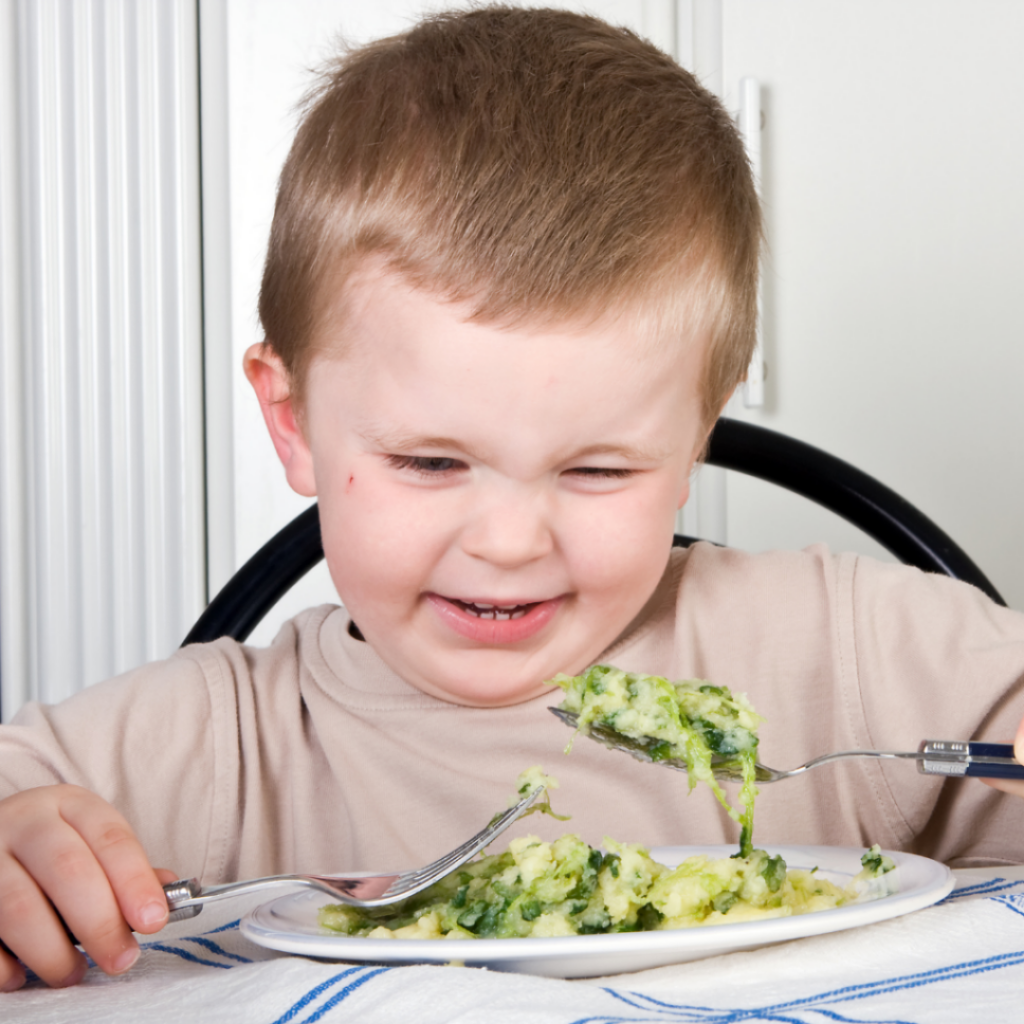
Time spent in the kitchen observing and handling different types of foods and having a hand in preparing food means that there is a greater chance of your toddler eating the food at mealtimes.
Things they’re uncomfortable touching at mealtime (because they assume they have to eat it or have negative associations with it at mealtime) all of a sudden become much more appealing to handle in the kitchen!
They get a closer and longer opportunity to smell, touch, and even taste-test along the way. This all counts as multiple exposures to foods they otherwise wouldn’t get near!
To learn more about our other strategies, and to get a holistic plan to prevent or tackle picky eating for good, check out our Feeding Toddlers online course.
It was developed using the best of feeding therapy but with lifetime access and ongoing support.
Currently 20% off with code HAPPY2025!
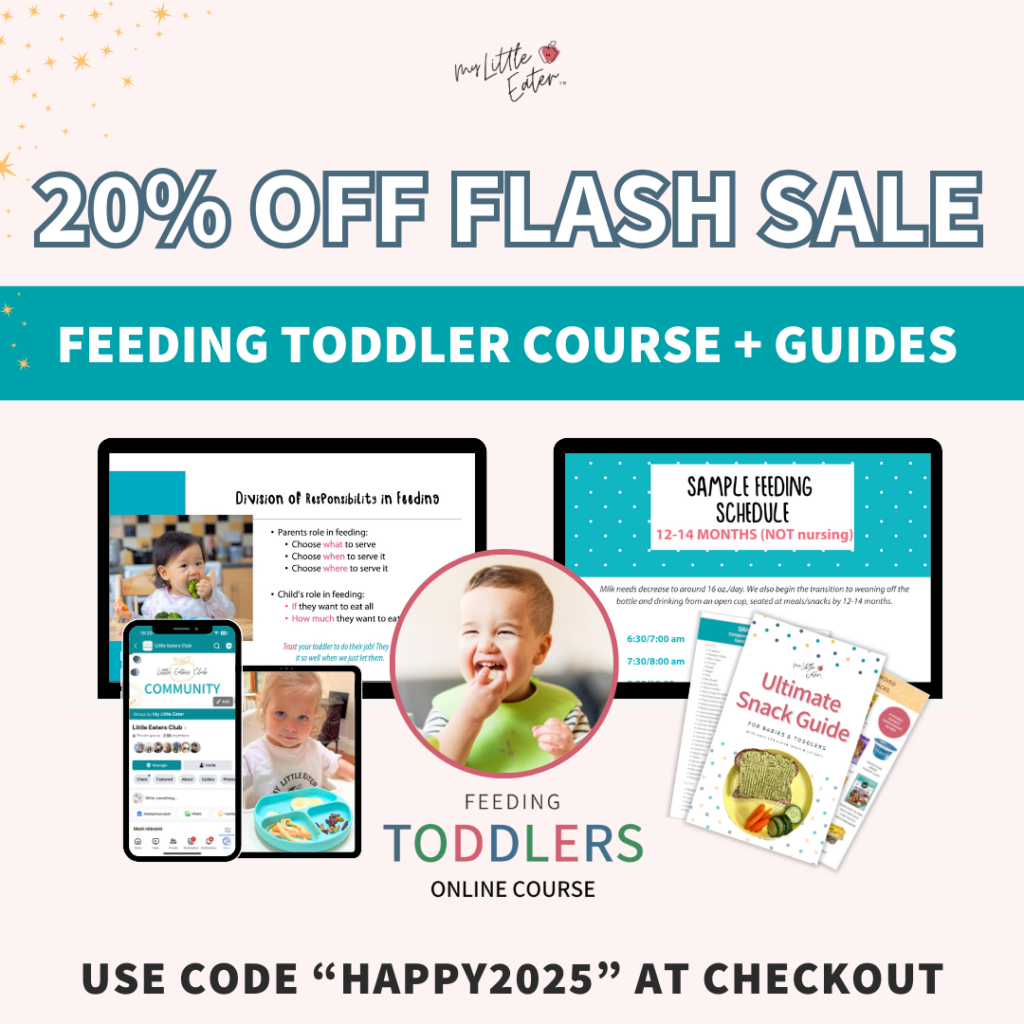
Reason #3: Long-term results are worth the effort
One of our most popular posts on Instagram is a simple reel showing my two boys cooking in the kitchen, on their own, making breakfast for my husband and me.
It’s every parent’s dream come true!
BUT – you can’t get there as quickly without having your toddler in the kitchen with you (meltdowns and all).
The more independent they are in the kitchen, the more you can look forward to mornings of sleeping in while they make their own (nutritious) breakfast, or use a simple recipe to make their lunch.
You might even be able to retire from snack duty if they can prep a healthy snack for themselves (and maybe even their siblings!).
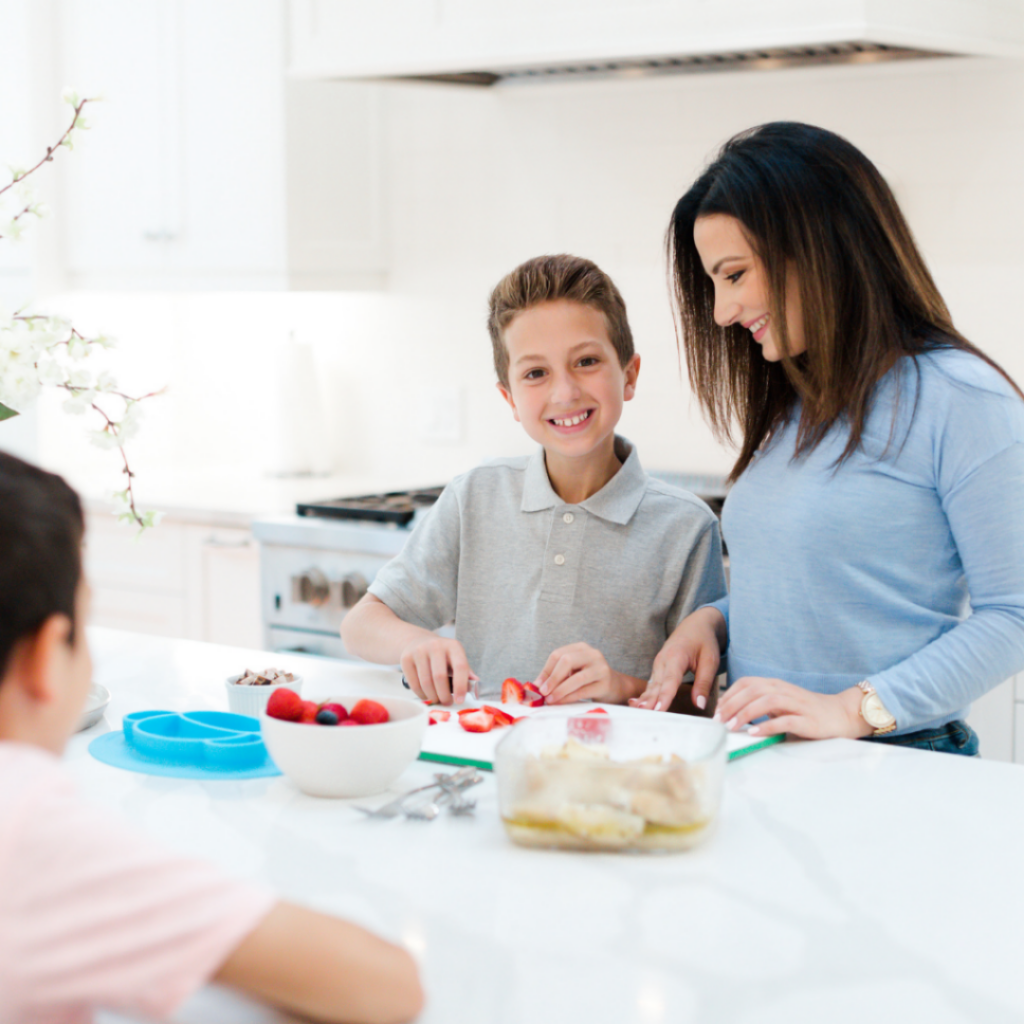
Think of how nice it will be to have them help prep a quick and easy meal for dinner – you’ll have a helping hand in the kitchen whenever you need it!
Top 6 tips for cooking with toddlers
Let’s get into how you can do this without the overwhelm and stress that often comes with teaching toddlers new skills and adding more to an already busy schedule.
#1: Do one kitchen activity per week
Like anything, if you want them to develop a love for something, they’ve got to spend time doing it so that they can appreciate it.
They won’t learn how to play a sport or dance or play an instrument the first time they try it. It takes practice to learn the skills and come to appreciate the hard work they put into learning something new.
The same goes for being in the kitchen.
We know it sometimes feels like it’s more work to have them in the kitchen, but it’s worth it to try to set up a consistent weekly kitchen session with your child to help form positive memories.
This doesn’t have to be some grand cooking adventure where you make a full family meal, just even 10 minutes doing simple tasks to help will be beneficial.
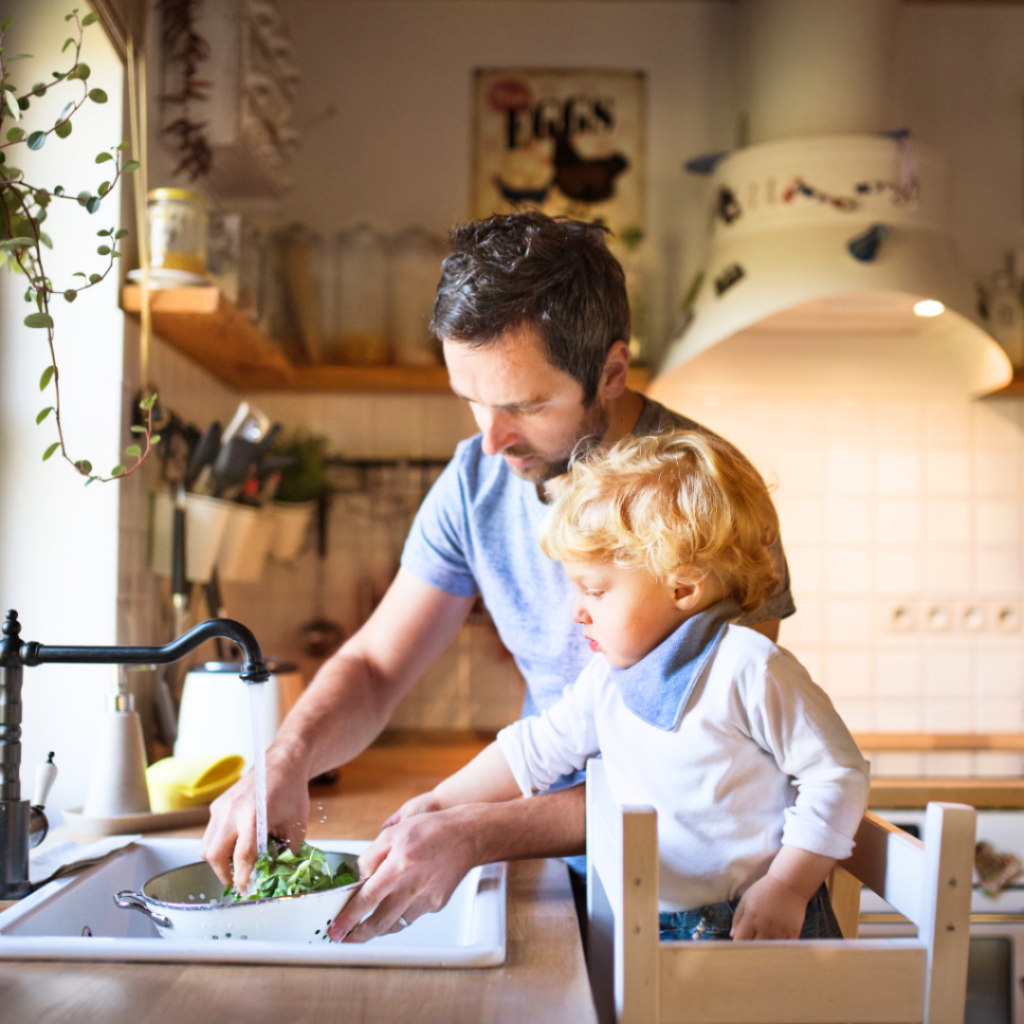
The key here is that it doesn’t need to happen every day.
It’s ok to say no to their offer to help sometimes and let them know when they’ll be cooking with you next. It saves your patience on those busy days when you can’t have them helping, and it will help prevent a meltdown because they know when they can help again.
Saturday mornings used to work great for us. Things were generally more relaxed and not as rushed so I had more patience to go at a slower pace for them and show them what to do. We made it our weekly thing to cook breakfast together for the family! Find what works for you and make it a habit.
#2: Build confidence by assigning age-appropriate tasks
Even babies can take part in kitchen activities! They don’t have to do much for it to be worthwhile to bring them in and start developing a love for cooking.
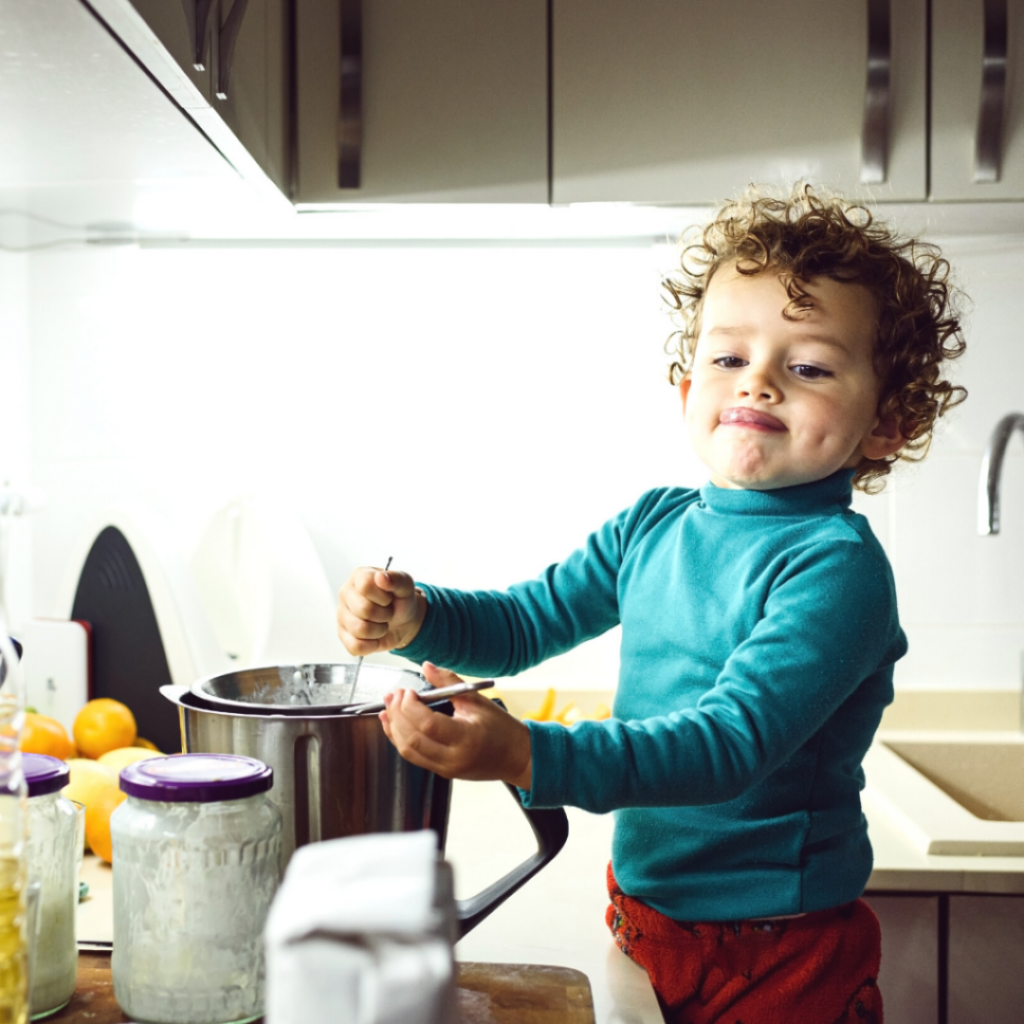
Let’s break down some simple tasks that your baby, toddler, and preschooler can be part of by age. Keep in mind that these are just a few things you can do with your child in the kitchen, and try to expand these lists from there based on their interests and skill level.
6-18 Months
Seat them in their highchair, pull them up next to you in the kitchen, and let them watch what you’re doing! Give them a utensil, or a piece of food (a non-choking hazard of course!), and let them feel like they’re helping you.
Let them smell and touch the ingredients. Talk to them out loud and walk them through what you’re doing.
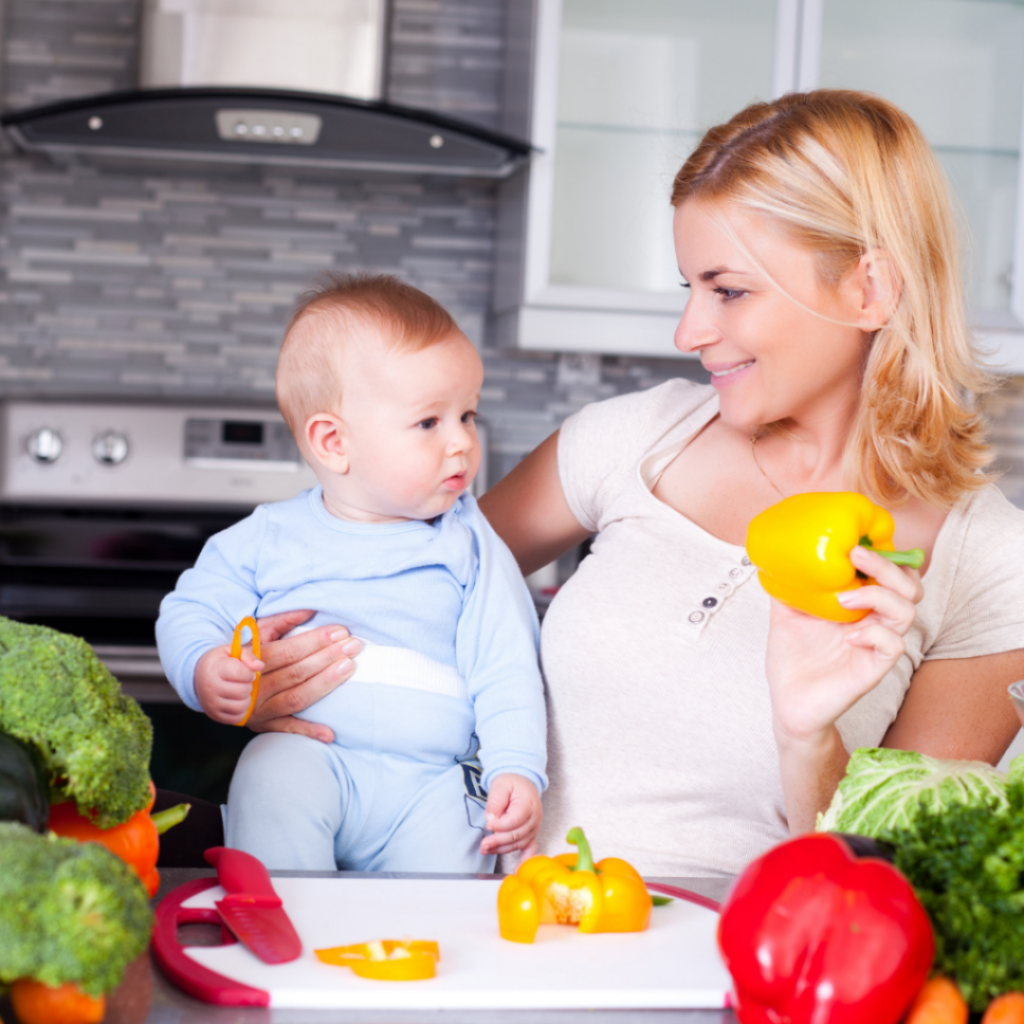
“I’m cutting the apples, and now I’m going to get the peanut butter and spread it on the apples like this.”
They don’t have to be able to see everything, and it may even seem like they aren’t listening much, but trust me, all the verbal instructions make them feel like part of the process. This starts to create that positive experience with cooking that we want them to have.
18 months - 3 years
This is when you can really start to get your toddler involved in the actual cooking process. Below are some of the easiest tasks you can have them help with.
Remember to talk with them throughout the process – even if they can’t talk back yet. This will create a feeling of inclusion, and bonding, which helps to contribute to an overall positive experience for them.
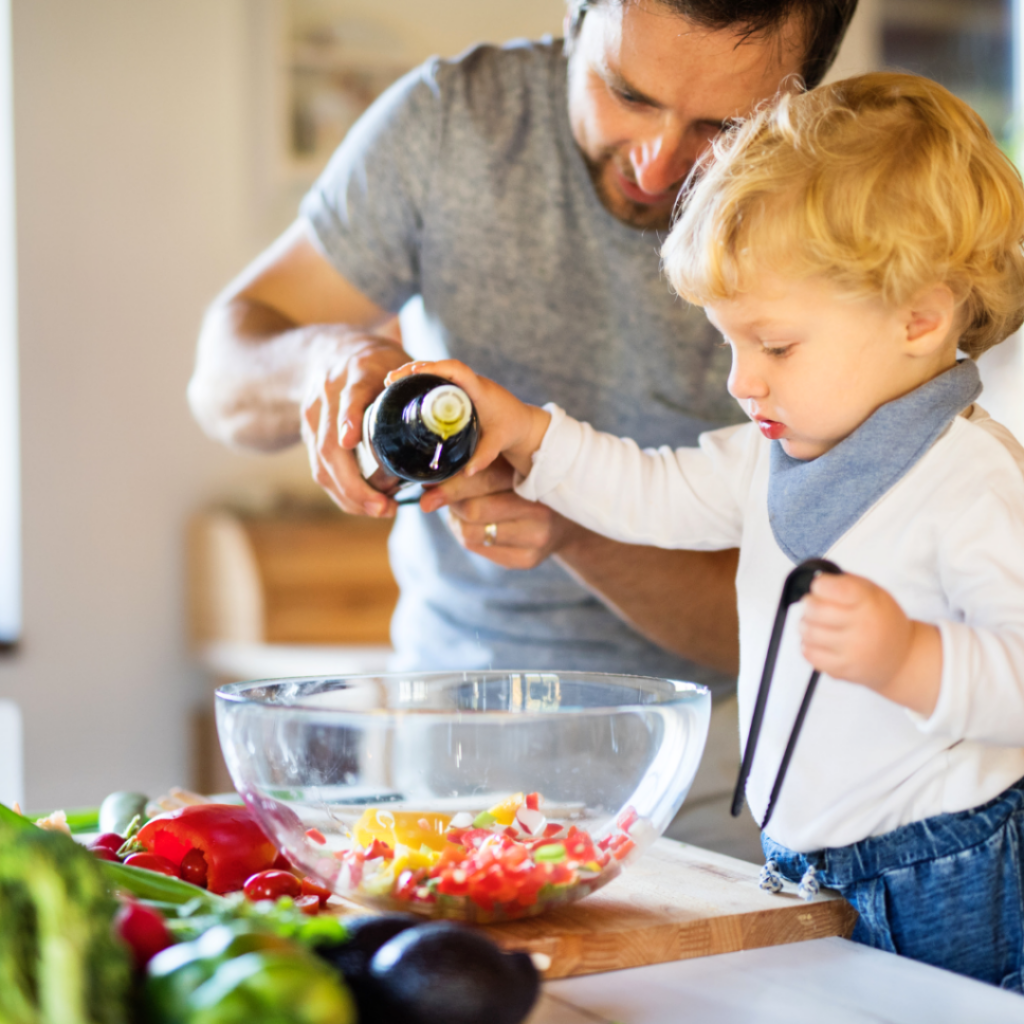
Toddlers can help in the kitchen by…
- Pouring dry and liquid ingredients into a bowl
- Rinsing fruits and vegetables
- Picking herbs off the stem
- Tearing greens into pieces
- Stirring batter in a bowl
- Sprinkling salt or herbs
- Sorting foods (ie. raspberries in this bowl, blueberries in this one)
- Using a butterknife (ie. spreading peanut butter, slicing bananas, etc.)
4-5 years
As they get older, they can graduate to help with more significant or difficult tasks in the kitchen. For these, some tools specific to young children may be required.
Get our free downloadable guide on recommended kitchen tools for toddlers and preschoolers.
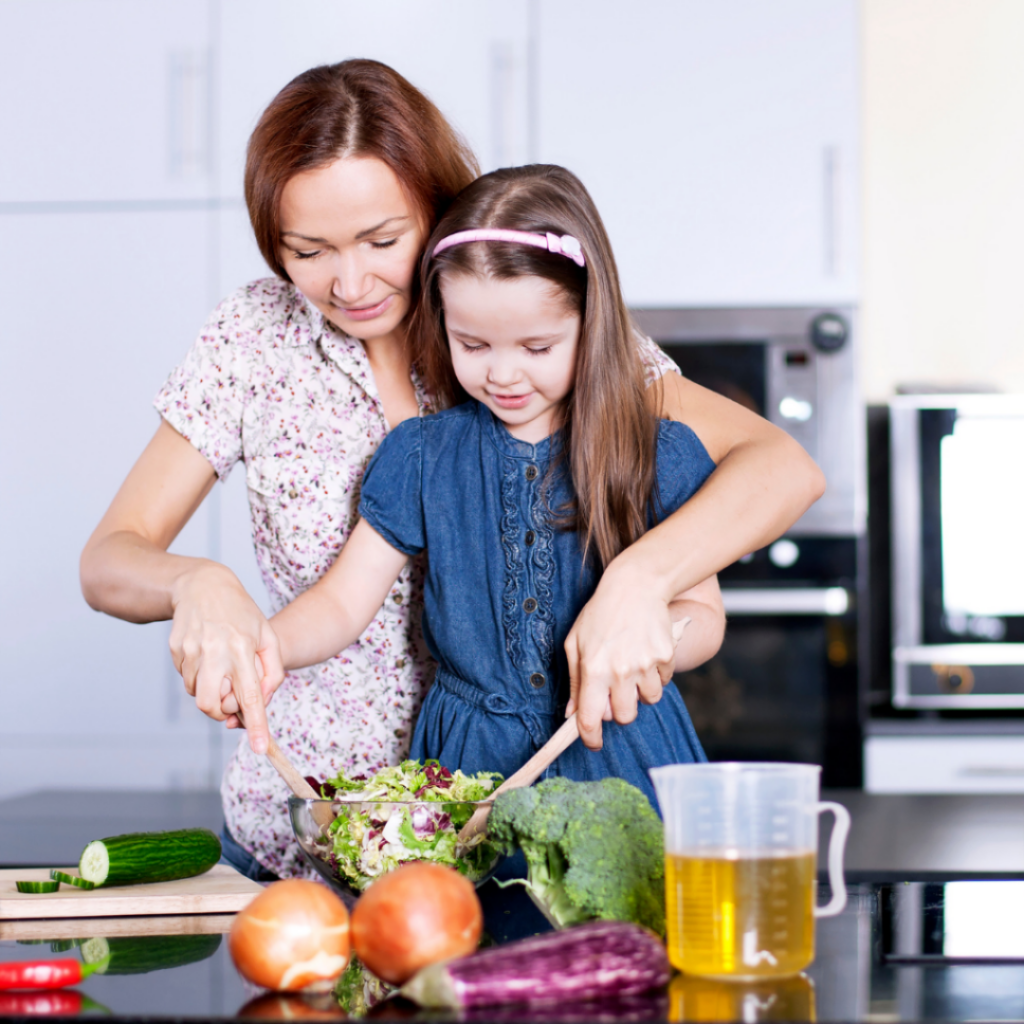
Preschoolers and young school-aged children can help by…
- Cutting soft foods with a kid’s safe knife
- Cracking eggs
- Measuring and leveling dry ingredients with a straight edge
- Spreading butter and jam
- Setting the cooking timer
- Whisking a vinaigrette or other sauce (provided it isn’t too thick to stir easily)
- Peeling a cooled hard-boiled egg
- Scrubbing potatoes
- Greasing a baking pan
5 - 9 years
Here’s where you really start to notice that these kitchen adventures together are more helpful than they are overwhelming!
We know that the toddler phase can be difficult to get through sometimes, but the fact that by age 5 they could be actually helping in the kitchen because of that experience is incredible!
The effort you put in with them at a young age allows you to reap the rewards sooner.
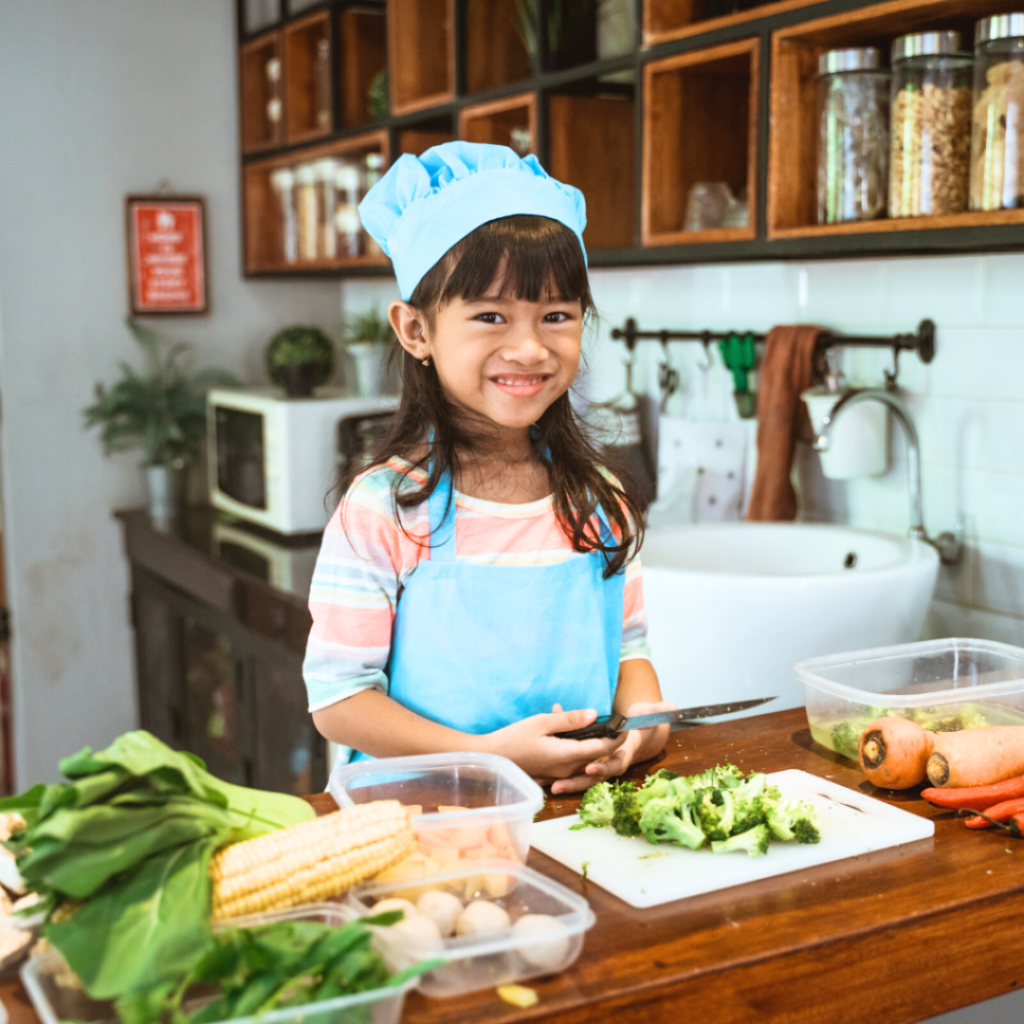
School-aged children can help in the kitchen by…
- Using real knives (paring knives closer to 5 years of age, and chef knives closer to 9 years of age) to help prep ingredients
- Cooking with you at the stove (sautéing, grilling, boiling, etc.)
- Using a can opener, garlic press, lemon squeezer, hand mixer, etc.
- Peeling fruits and vegetables
- Grating cheese with a box grater
- Draining and slicing tofu
- Forming patties for burgers (try making our Apple Sage Beef Burgers with them!)
- Slicing bread
- Threading food onto skewers
- Scooping batter into muffin cups (try making our Chicken Curry Rice Cups with them!)
- Reading recipes
- More advanced measuring (fractions, etc.)
It’s like having your own personal sous chef to do the mundane tasks that you may not enjoy, but that they will think are the coolest.
#3: Involve toddlers in meal planning
Let them choose at least one complete meal a week to add to your meal plan. You can do this by scrolling through some fun recipes online or flipping through a favorite recipe book at home.
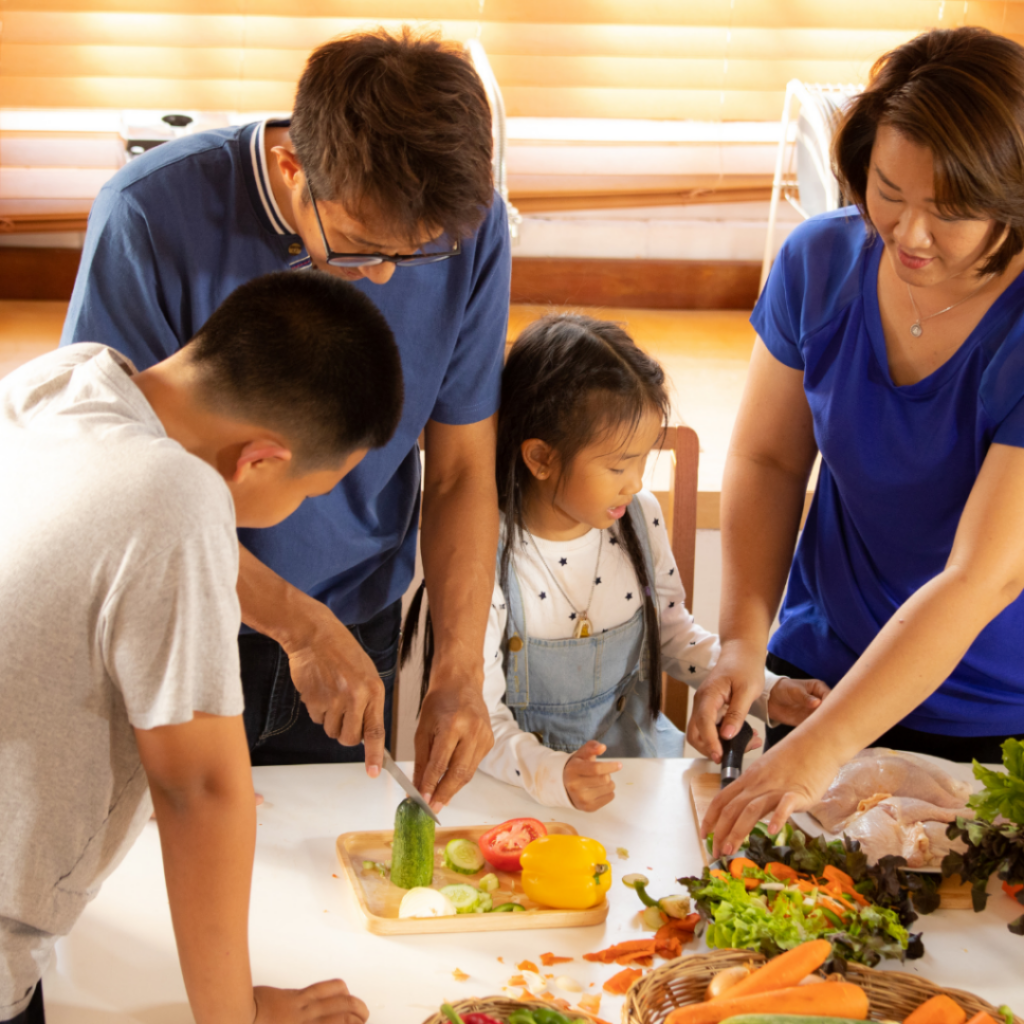
We have lots of delicious recipes pinned to various boards on our Pinterest page that would be the perfect place to browse!
The more control they feel over the process, the more excitement about it they’ll have – and the more cooperative they’ll be!
#4: Let kids cook a meal for someone
Nothing is more exciting than cooking for a dad, sibling, or better yet…for grandparents! Kids get such a sense of pride when their loved ones try a meal they helped make (and everyone inevitably says it’s the best meal they’ve ever had!).
And as they get older, continue to hand more of the tasks off to them. The more they do for themselves, the more they will see how capable they are, and eventually they won’t feel like they need your help at all.
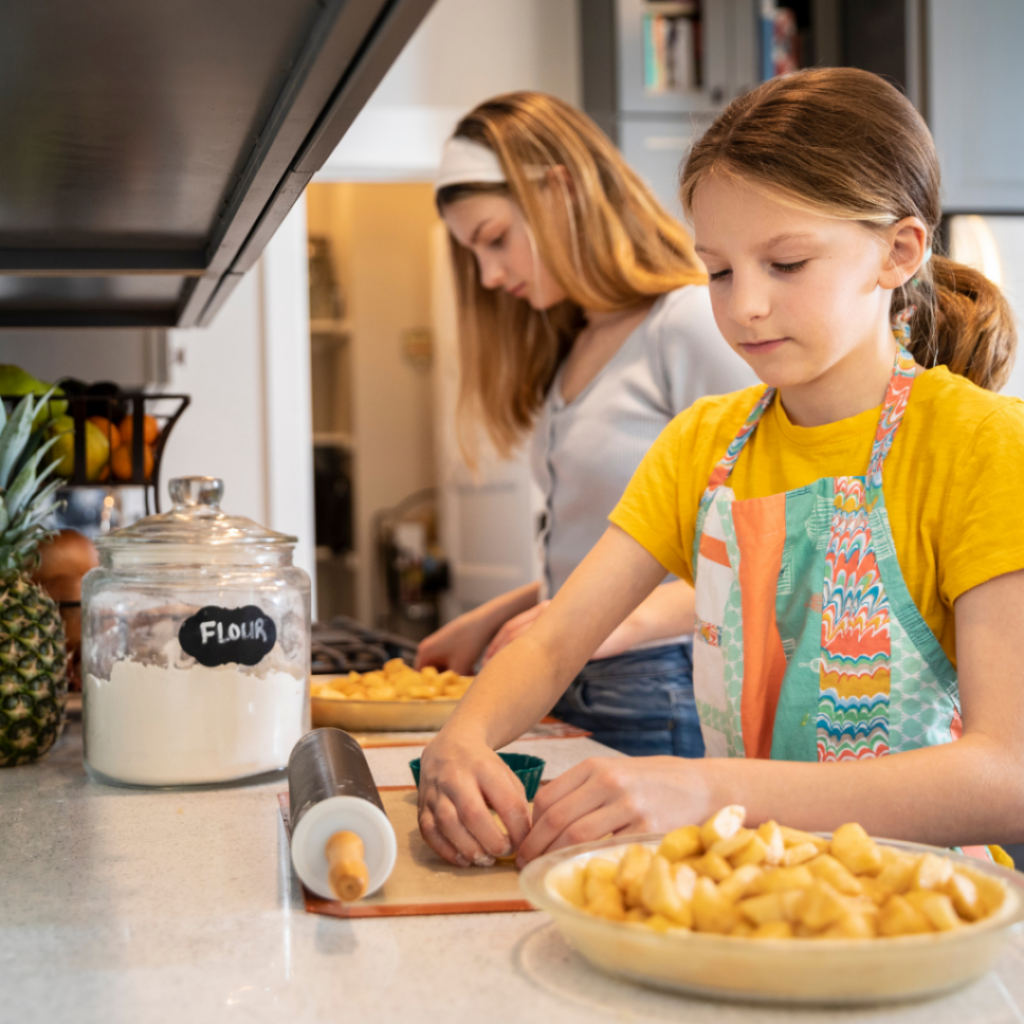
That’s how you end up with kids who can make themselves simple meals – or better yet – make those meals for you!
#5: Don’t pressure but encourage exploration
A lot of times we have hidden agendas when it comes to activities around food. We want our kids to eat the salad we’re washing, to eat the broccoli we’re chopping, etc. And not only eat it…but like it!
These types of expectations result in a pressured environment. Feeling pressured when doing an activity takes out the fun and makes your toddler less likely to want to participate.
This is why pressuring at the dinner table results in kids not wanting to come to the table to eat dinner. It’s why they push back and act up around food. That is NOT the feeling and experience we want them to have in the kitchen (let alone at the dinner table).
Instead of pressuring them to eat and try new foods while you prepare meals, encourage them to explore and talk about the food – like you’re scientists – or get curious about it like a chef.
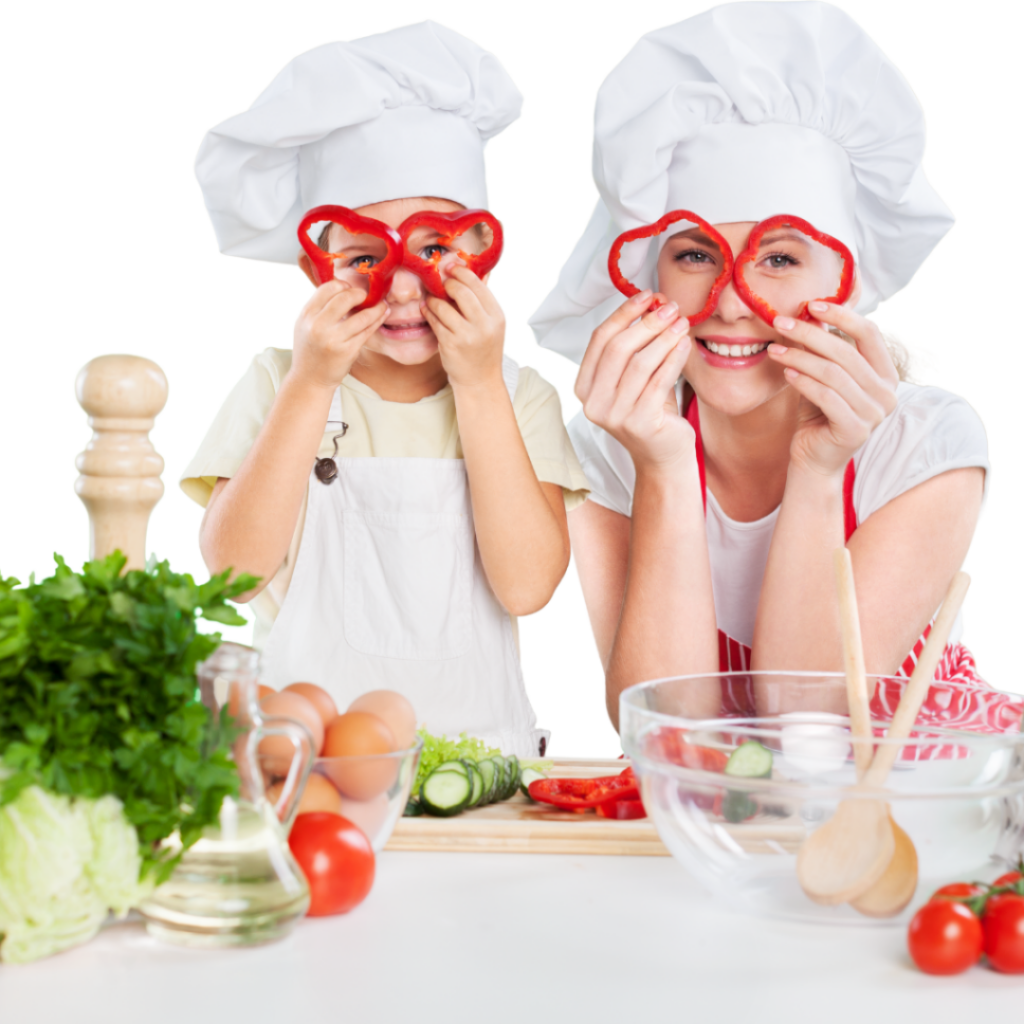
What happens when I put this and this together?
What do you notice about the texture once you start heating it up?
Do you think this would taste better with this spice or this spice? How do you know?
You’ll find that when you don’t directly make it about eating and instead make it about touching, smelling, and tasting (like a chef…and only if they want to), you’ll see that the likelihood that they are willing to eat it will jump up 1000%.
Fun fact!
Toddlers have 30,000 taste buds and every 2 weeks their taste buds change!
This is true, and it works wonders for encouraging your toddler to try foods that they’ve previously hated.
Here’s what you do…while you’re cooking together or even at the table, you can encourage exploration by teaching them about their taste buds. Let them know how many they have and that they change.
Follow it up with…“Do your new taste buds like this food now?”.
Toddlers are naturally curious so they’ll want to know if their taste buds have changed and if now they like something they didn’t before. Maybe they’ll try it and not like it…“That’s ok, maybe the next time you get new taste buds you’ll like it!”. Or maybe they try it and find they do like it…“Wow, how cool is it that your taste buds can change like that!”.
Keep them curious and their natural tendency to explore will come out!
#6: Keep it positive!
The final tip is to keep things positive. This means you…
- Show them what to do but avoid constantly correcting them.
- Let them try things on their own instead of saying “watch me do it”.
- Give them space to be messy without hovering around them with a cloth to clean up right away.

We know letting go of some of the control and embracing the mess and chaos can be difficult.
Set yourself up for success by choosing a day when you have lots of time available, meal prep isn’t rushed, and you have time to clean up at the end. This will provide space for the patience you need while they take their time with each step and help you clean up mess after mess.
Bonus tip!
If you feel yourself starting to frown or that familiar pull to clean up something they spilled, smile instead. It sounds a bit ridiculous, but just the act of smiling through the stress can help you notice how sweet or funny the moment really is.
Focus on how cute the dimples on their cheeks look all covered in flour or laugh at the shredded cheese that fell on your dog’s head as they worked. Those little moments often make the best memories when you look back at them years later – don’t miss them!
Listen to their favorite tunes, or dance while you stir ingredients. The more fun you have together, the more likely they’ll want to continue cooking with you again and again.

Before long, you’ll have a child who – despite having a busy schedule and friends to see – will look forward to Friday nights cooking with the whole family and experimenting with new recipes because it’s been one of their happiest memories throughout their childhood.
Take it from me, I’ve reached that point of parenthood already, and it’s a beautiful thing!
Before you know it, you’ll be raising a child who’ll have competency in the kitchen, who’ll overcome picky eating, and who can one day pass on the same love for cooking to their children.
If you’re struggling with a picky toddler (or scared that you’re heading in that direction) check out our Feeding Toddlers online course for a complete step-by-step process for preventing or reversing picky eating. It’s based on expert feeding therapy, with a mom’s touch to make these strategies doable for a busy mom and ensure you see success.
We provide you with the tools you need to get started and build on those with each lesson. We don’t just teach you the tips to try at your discretion. This is all about building toward success – no band-aids or duct tape solutions here!
Currently 20% off using code HAPPY2025!
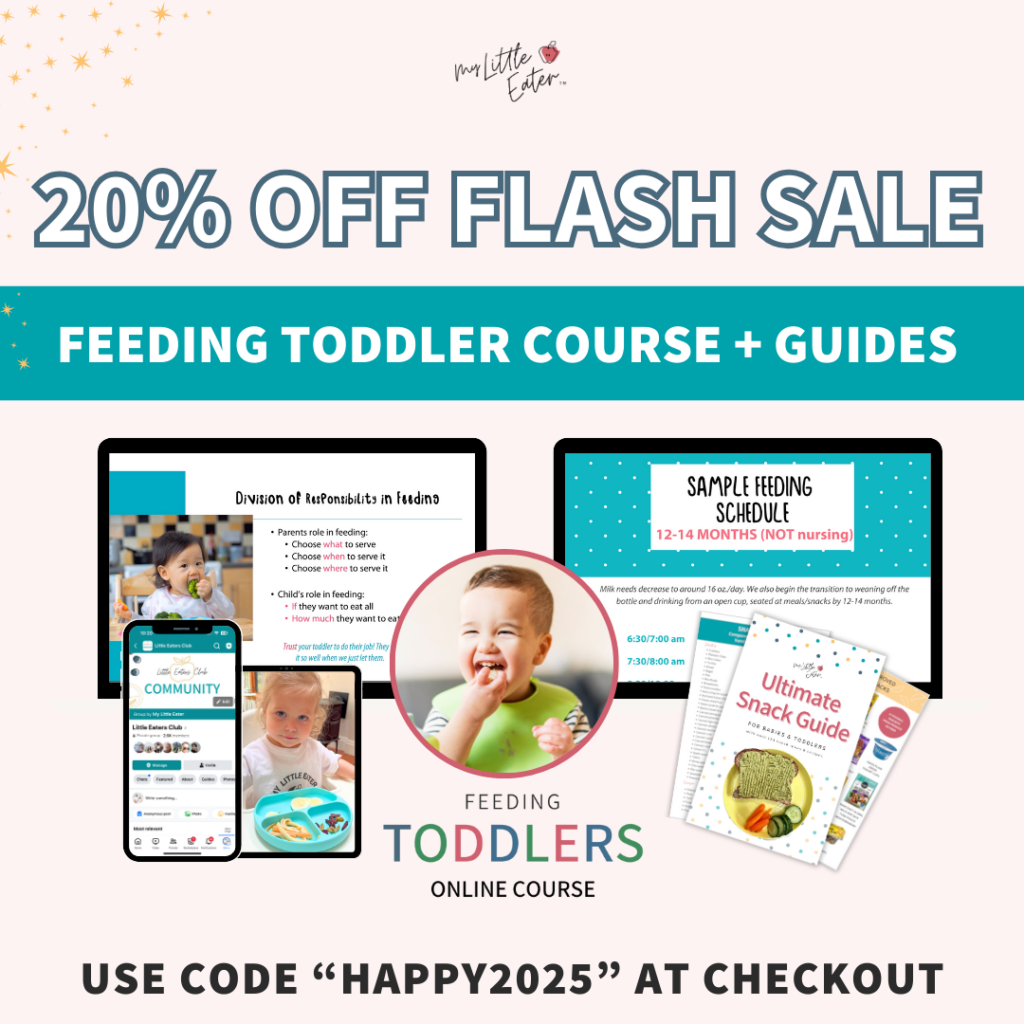
Pin these tips for later!
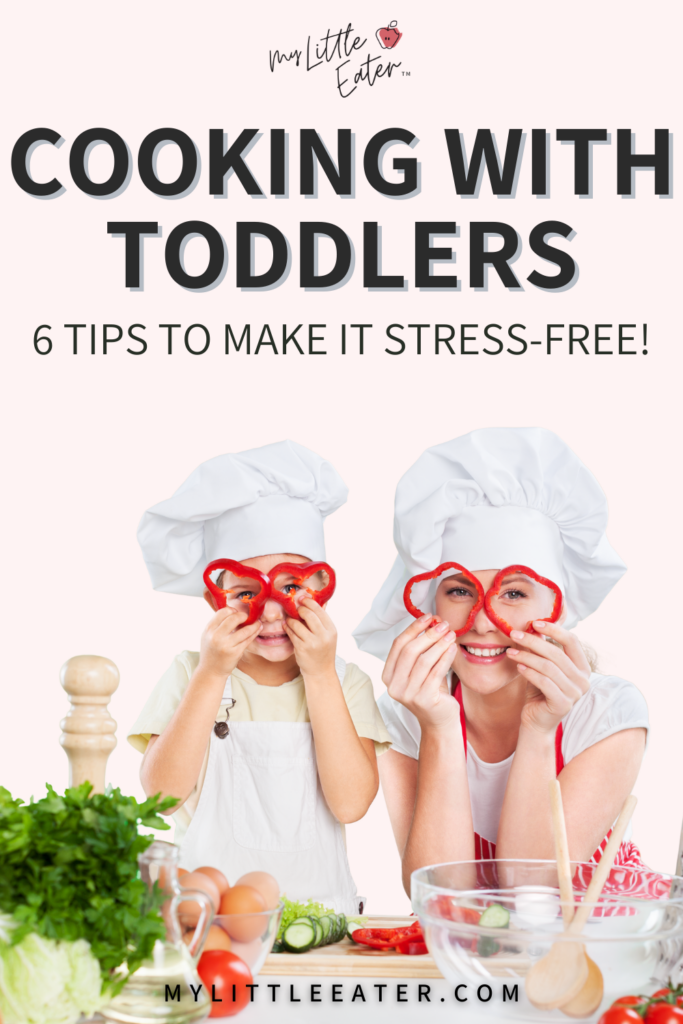

Edwena Kennedy, RD
Founder and lead Registered Pediatric Dietitian at My Little Eater Inc., creator of The Texture Timeline™, and mom of two picky-turned-adventurous eaters.

Edwena Kennedy, RD
Founder and lead Registered Pediatric Dietitian at My Little Eater Inc., creator of The Texture Timeline™, and mom of two picky-turned-adventurous eaters.
